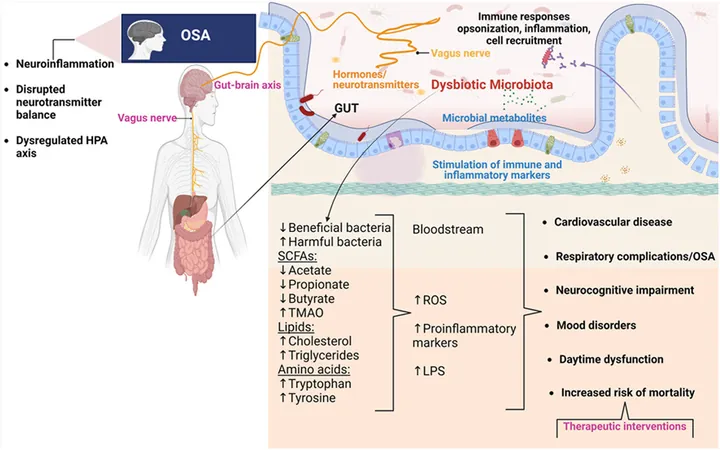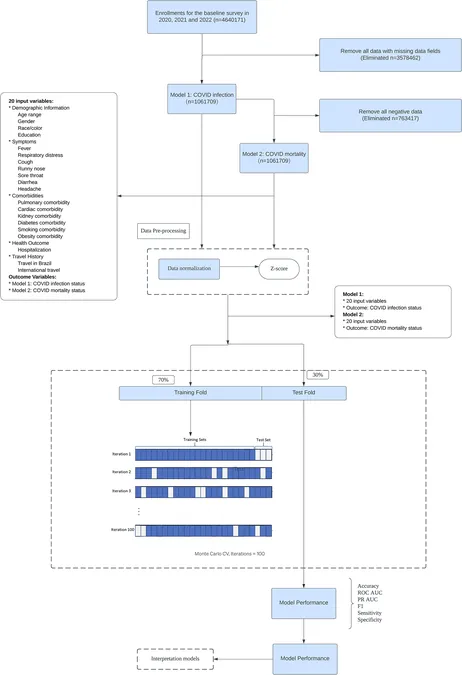
Unlocking Sleep: How Your Gut Health Might Hold the Key to Treating Sleep Apnea
2025-04-14
Author: John Tan
Revolutionary Research Connects Gut Health and Sleep Apnea
A groundbreaking review by researchers from the Marshall University Joan C. Edwards School of Medicine is shedding light on an unexpected link between gut health and sleep apnea, raising hopes for innovative new treatments for this widespread and serious condition.
Published in the journal Sleep Medicine, the study, spearheaded by medical student Rebecca Hicks alongside esteemed faculty, probes the intriguing role of gut microbiota—the complex ecosystem of microorganisms in our digestive systems—in influencing sleep-related breathing disorders.
The Gut Connection: What Science is Revealing
Recent evidence indicates that individuals with sleep apnea often exhibit significant alterations in their gut microbiota. These imbalances may lead to a condition known as "leaky gut," which compromises intestinal integrity and fuels systemic inflammation, exacerbating the severity of sleep apnea symptoms and potentially leading to serious health complications.
"Emerging research suggests that variations in gut microbiota diversity could impact the onset or worsening of sleep apnea symptoms," shared Hicks, highlighting how gut dysfunction may interact with inflammation, immune responses, and the unique communication pathways between the gut and the brain.
Extracellular Vesicles: The Tiny Messengers of Change
The study also investigates the role of extracellular vesicles (EVs)—microscopic particles that carry critical signals. These little messengers may play a pivotal role in sleep regulation by influencing immune functions or transmitting microbial communications to the brain, presenting potential biomarkers or therapeutic targets for sleep apnea treatment.
A Call for More Research and Exploration
The research team, including noted experts like David Gozal, M.D., M.B.A., Ph.D. (Hon), and Sarfraz Ahmed, Ph.D., advocates for extensive longitudinal studies to explore how shifts in gut microbiome over time might shape the development and ramifications of sleep apnea. They urge further investigation into how various microbial species and their byproducts can affect sleep and propose developing treatment strategies focusing on improving gut health to manage sleep apnea.
"It's inspiring to see medical students leading the charge in investigating intricate new realms like the gut-sleep relationship," remarked Khalyfa, professor of biomedical sciences at Marshall University and a mentor to Hicks. "This research not only enhances our understanding of sleep apnea but underscores the essential role emerging professionals can have in pioneering the future of medicine and sleep health through creativity and collaboration."






 Brasil (PT)
Brasil (PT)
 Canada (EN)
Canada (EN)
 Chile (ES)
Chile (ES)
 Česko (CS)
Česko (CS)
 대한민국 (KO)
대한민국 (KO)
 España (ES)
España (ES)
 France (FR)
France (FR)
 Hong Kong (EN)
Hong Kong (EN)
 Italia (IT)
Italia (IT)
 日本 (JA)
日本 (JA)
 Magyarország (HU)
Magyarország (HU)
 Norge (NO)
Norge (NO)
 Polska (PL)
Polska (PL)
 Schweiz (DE)
Schweiz (DE)
 Singapore (EN)
Singapore (EN)
 Sverige (SV)
Sverige (SV)
 Suomi (FI)
Suomi (FI)
 Türkiye (TR)
Türkiye (TR)
 الإمارات العربية المتحدة (AR)
الإمارات العربية المتحدة (AR)